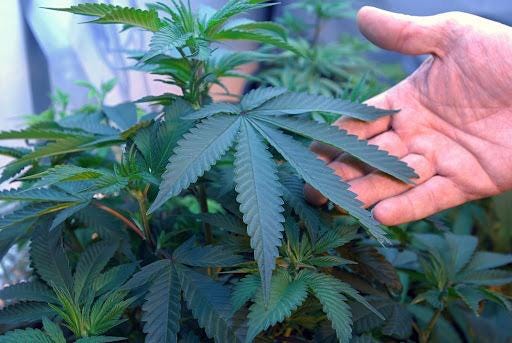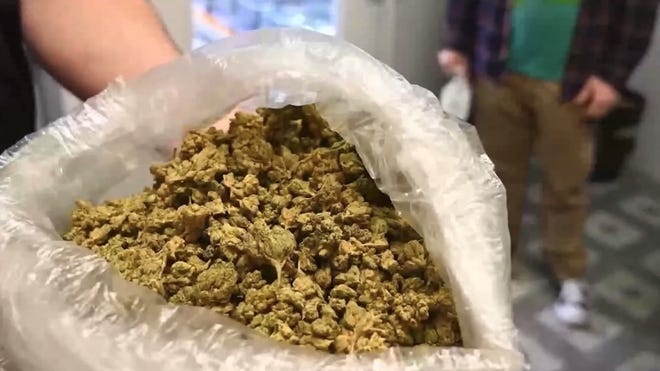- Bill would allow residents 21 and older to legally own 30 grams of cannabis flower
- Bill would also allow licensed medical marijuana patients to grow up to five plants in their home
- Anyone convicted of a nonviolent marijuana crime would have their criminal records cleared
- To date, 14 states and Washington DC have legalized recreational marijuana
State Senator Dan Laughlin of Erie County will be the first Republican in Pennsylvania legislature to endorse a bill legalizing the use and possession of marijuana for adults 21 and older.
Laughlin of Millcreek, R-49th Dist., Plant, on Wednesday with Senator Sharif Street of Philadelphia, D-3rd Dist.
“I consider this to be the most responsible approach,” he said. “We have already legalized medical marijuana and regulating adult use is taking a big bite out of the black market. Also, people who are already using this product can be more responsible and buy it from a safe, properly labeled source.”
Laughlin’s support for the legalization of marijuana for non-medical uses marks a possible shift within the state’s GOP on an issue that has largely been avoided.
More:Rise Erie’s second medical marijuana dispensary opens in Summit Township
Although Governor Tom Wolf and Lt. Governor John Fetterman proposed legalizing recreational marijuana, and Democratic lawmakers, including Street, tabled three separate bills in recent years, efforts at GOP control have had little or no effect on the General Assembly.
Laughlin expects some Republicans will sign up as co-sponsors after the law is passed.
“We made sure there was a home-grown component for medical card holders,” said Laughlin. “There is a strong focus on creating microculture centers so that mother and pop types can be included. There is a strong component of social justice so that many of the communities hardest hit by the war on drugs are taking a step towards profit can business.
“This bill would wipe out all nonviolent marijuana convictions,” he added. “We are using language to protect the rights of the second amendment, as well as making every effort in the country to keep them out of the hands of people under the age of 21.”
The bill would amend the Medical Marijuana Act of 2016.
Under the bill, individuals 21 and older who have been resident in Pennsylvania for at least a month are legally allowed to own 30 grams – no more than an ounce – of cannabis flower. Cannabis infused products containing no more than 500 milligrams of THC; and 5 grams of cannabis concentrate.
The bill would also allow licensed medical marijuana patients to grow up to five plants that are more than five inches tall in their home without a grow center license, as long as an amount of marijuana produced is greater than 30 grams on the ground property on which it was grown remains secured. Property owners and landlords have the right to prohibit tenants and tenants from growing plants.
The bill would allow anyone convicted of an offense that would be decriminalized under the bill to clear their criminal record as long as the offense was non-violent.
Laughlin has also worked out a firearms regulation so that gun owners are not punished.
The law would establish the Pennsylvania Cannabis Regulatory Control Board and abolish the Department of Health’s medical marijuana program within a year. The board would oversee both state and adult marijuana laws.
Initially, the state would issue licenses for 100 cultivation centers and 528 pharmacies. Of these, 480 pharmacies could sell both medical marijuana and recreational marijuana, while the other 48 could only dispense medical marijuana.
In addition to the 6% state sales tax, the bill would include a 10% excise tax on the sale of marijuana and marijuana products.
More:PA Budget: 5 Things Erie Wants To See, From Community College Funds To Legalizing Marijuana
Income from taxes, permits, licenses, and other fees would create a cannabis regulatory fund.
According to the independent tax office, the state would generate revenues between $ 400 and 1 billion annually.
Laughlin said the COVID-19 pandemic, which caused a hole in the state budget, had nothing to do with his support for the bill.
“I know there are a lot of people who believe this will be a great source of income, but that is at the bottom of my list of reasons to start this bill,” he said. “Here we are as a country. The majority of the people want this to be legalized and regulated.”
A portion of the proceeds would be diverted to a Cannabis Business Development Fund, which provides financial assistance, low-interest loans, grants and technical assistance to qualified social and economic justice applicants. The program would help people pay the start-up and running costs of a marijuana business.
To qualify for the Social and Economic Justice Program, an applicant (or applicant) with at least 75% ownership and control must have lived or been arrested on conviction by or in a “disproportionately affected area” for at least five of the last 10 years convicted as a criminal for an offense that is eligible for expulsion under the law. Program qualifications would also exclude an individual who is earning more than $ 75,000 in annual income and / or has financial assets in excess of $ 250,000 from owning more than 5% of the business.
Legislation defines a “disproportionately affected area” as a census tract that has a high rate of arrests, convictions, and incarcerations related to the sale, possession, use, cultivation, manufacture, or transportation of cannabis, and which is also one of the various economic sectors Conditions meets criteria such as a poverty rate of 20% or an unemployment rate that is more than 120% of the national unemployment rate for 12 consecutive months.
On Monday, New Jersey became the last state to legalize marijuana when Governor Phil Murphy signed a law allowing people 21 and older to use and possess up to 6 ounces of marijuana. To date, 14 states and Washington DC have legalized recreational marijuana.
Contact Matthew Rink at [email protected]. Follow him on Twitter at @ETNrink.

